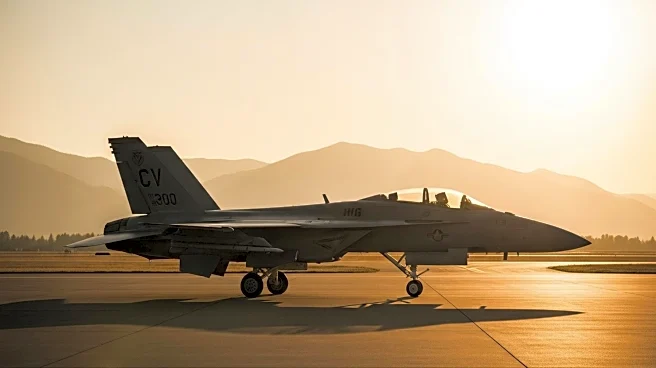What is the story about?
What's Happening?
Defense Secretary Pete Hegseth announced a finalized agreement allowing the Qatari Emiri Air Force to build a facility at the Mountain Home Air Force Base in Idaho. This facility will host Qatari F-15s and pilots, enhancing combined training and interoperability with U.S. forces. The announcement was made alongside Qatari Minister of Defense Sheikh Saoud bin Abdulrahman Al Thani at the Pentagon. The move signifies the Trump administration's strengthening relationship with Qatar, which has also played a substantial role in the Israel-Hamas peace deal.
Why It's Important?
The establishment of a Qatari facility at a U.S. base underscores the strategic partnership between the United States and Qatar, enhancing military cooperation and training capabilities. This development may bolster U.S. military readiness and interoperability with allied forces, potentially influencing regional security dynamics. The agreement also reflects broader geopolitical ties, as Qatar's involvement in peace negotiations highlights its diplomatic significance. The decision to accept a luxury jetliner from Qatar for presidential use has sparked debate over ethical and national security concerns.
What's Next?
The facility's construction will proceed, with Qatari pilots expected to begin training alongside U.S. forces. This collaboration may lead to further military agreements or joint exercises, strengthening bilateral ties. The Trump administration's executive order assuring Qatar's security could prompt additional diplomatic or military commitments. Stakeholders, including defense officials and policymakers, will likely monitor the facility's impact on U.S.-Qatar relations and regional security.
Beyond the Headlines
The ethical implications of accepting a luxury jetliner from Qatar for presidential use may continue to be scrutinized, raising questions about transparency and national security. The facility's presence could influence U.S. foreign policy, particularly in the Middle East, as Qatar's strategic role in peace negotiations and regional stability becomes more pronounced.
















